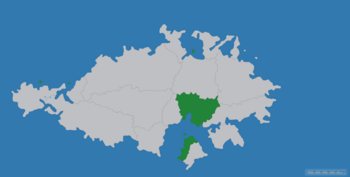Icardia: Difference between revisions
Agrincourt (talk | contribs) |
Agrincourt (talk | contribs) No edit summary |
||
| Line 59: | Line 59: | ||
Icardia, officially '''The Republic of Icardia''', is a sovereign nation located in [[Arcadia]]. The main body of Icardia (referred to as Metropolitan Icardia) is located in the southern-central part of the continent, situated within the Bay of Chishil and with its northern border running along the Central Western Highlands. The country consists of Metropolitan Icardia, along with the island territories of [[Conta]], [[Dunteria]], [[Newleigh]], and the island prefecture of [[Chishil]]. It is bordered by the Lohti Republic to the west, the Republic of the Isaar to the north-west, the Commonwealth of Neria directly north, and the Republic of Holteria to the east. It is the second most populous country in Arcadia, after Aquitaine, with a population of 76 million across an area of 572,000km<sup>2</sup>. | Icardia, officially '''The Republic of Icardia''', is a sovereign nation located in [[Arcadia]]. The main body of Icardia (referred to as Metropolitan Icardia) is located in the southern-central part of the continent, situated within the Bay of Chishil and with its northern border running along the Central Western Highlands. The country consists of Metropolitan Icardia, along with the island territories of [[Conta]], [[Dunteria]], [[Newleigh]], and the island prefecture of [[Chishil]]. It is bordered by the Lohti Republic to the west, the Republic of the Isaar to the north-west, the Commonwealth of Neria directly north, and the Republic of Holteria to the east. It is the second most populous country in Arcadia, after Aquitaine, with a population of 76 million across an area of 572,000km<sup>2</sup>. | ||
The history if Icardia is long and varied. During the Bronze Age, Icardia was home to the Orbury River Civilisation, which was dominated by minor city-states as the main form of polity. This lasted until approximately 700 BCE, at which point a series of famines and droughts is believed to have forced a consolidation of the cities into a single political entity. Based on the discovery of hundreds of tablets and inscriptions, it is believed that these city states fell under the hegemony of the Kingdom of Wihusea. By | The history if Icardia is long and varied. During the Bronze Age, Icardia was home to the Orbury River Civilisation, which was dominated by minor city-states as the main form of polity. This lasted until approximately 700 BCE, at which point a series of famines and droughts is believed to have forced a consolidation of the cities into a single political entity. Based on the discovery of hundreds of tablets and inscriptions, it is believed that these city states fell under the hegemony of the Kingdom of Wihusea. By 1 AD, the kingdom had been annexed by the Auxyrian Empire and [[Monocentrism]] was introduced as a state religion. In 350 AD, a major battle occurred on the Migny river in modern-day Aquitaine. It was a pyrrhic victory for Wihusea after which it rebelled agains the empire and was re-established as the Kingdom of Icardia. In the 11th century, Icardia came into a personal union with Holteria, subsequently becoming the United Kingdom of Icardia and Holteria. This would last until the late 17th century, and during this period, Icardia established a hegemony over central Arcadia. | ||
The modern state of Icardia came into being following the [[Great Famine]] of 1762 and the subsequent [[Long Strife]] which would last until 1780. During this tumultuous period, the monarchy was overthrown and the king executed, and a republican system of government was introduced. However, its hegemony over central Arcadia had been broken. Backed by a booming economy, the industrial revolution, and high population growth, the newly-found republic would establish a colonial empire across Arcadia and various other continents. It was first victorious in the [[First Arcadian War]] which lasted from 1832 to 1836, and the [[Second Arcadian War]] which lasted from 1905 to 1907. Despite these victories, the republic was forced to abandon its empire and grant independence to many of its territories. This can primarily be attributed to the high economic cost, as well as the loss of many lives during the aforementioned conflicts. It participated in the [[Third Arcadian War]] in a primary capacity, emerging victorious for the third and final time. It was subsequently a founding member of the [[Arcadian Cooperation Council]]. | The modern state of Icardia came into being following the [[Great Famine]] of 1762 and the subsequent [[Long Strife]] which would last until 1780. During this tumultuous period, the monarchy was overthrown and the king executed, and a republican system of government was introduced. However, its hegemony over central Arcadia had been broken. Backed by a booming economy, the industrial revolution, and high population growth, the newly-found republic would establish a colonial empire across Arcadia and various other continents. It was first victorious in the [[First Arcadian War]] which lasted from 1832 to 1836, and the [[Second Arcadian War]] which lasted from 1905 to 1907. Despite these victories, the republic was forced to abandon its empire and grant independence to many of its territories. This can primarily be attributed to the high economic cost, as well as the loss of many lives during the aforementioned conflicts. It participated in the [[Third Arcadian War]] in a primary capacity, emerging victorious for the third and final time. It was subsequently a founding member of the [[Arcadian Cooperation Council]]. | ||
Revision as of 08:52, 6 June 2021
Republic of Icardia | |
|---|---|
 Location of Icardia within Arcadia including overseas territories (both in dark green) | |
| Capital | Amberg |
| Largest city | Durham |
| Official languages | Icardian |
| Demonym(s) | Icardian |
| Government | Unitary parliamentary republic |
• President | Noah Wilkins |
• Prime Minister | Sophia Brown |
| Legislature | Parliament |
| Senate | |
| National Assembly | |
| Population | |
• 2020 census | 76,077,899 |
• Density | 133/km2 (344.5/sq mi) |
| GDP (nominal) | 2020 estimate |
• Total | £3.897 trillion |
• Per capita | £51,231 |
| HDI (2020) | 0.903 very high |
| Currency | Icardian Pound |
| Driving side | left |
Icardia, officially The Republic of Icardia, is a sovereign nation located in Arcadia. The main body of Icardia (referred to as Metropolitan Icardia) is located in the southern-central part of the continent, situated within the Bay of Chishil and with its northern border running along the Central Western Highlands. The country consists of Metropolitan Icardia, along with the island territories of Conta, Dunteria, Newleigh, and the island prefecture of Chishil. It is bordered by the Lohti Republic to the west, the Republic of the Isaar to the north-west, the Commonwealth of Neria directly north, and the Republic of Holteria to the east. It is the second most populous country in Arcadia, after Aquitaine, with a population of 76 million across an area of 572,000km2.
The history if Icardia is long and varied. During the Bronze Age, Icardia was home to the Orbury River Civilisation, which was dominated by minor city-states as the main form of polity. This lasted until approximately 700 BCE, at which point a series of famines and droughts is believed to have forced a consolidation of the cities into a single political entity. Based on the discovery of hundreds of tablets and inscriptions, it is believed that these city states fell under the hegemony of the Kingdom of Wihusea. By 1 AD, the kingdom had been annexed by the Auxyrian Empire and Monocentrism was introduced as a state religion. In 350 AD, a major battle occurred on the Migny river in modern-day Aquitaine. It was a pyrrhic victory for Wihusea after which it rebelled agains the empire and was re-established as the Kingdom of Icardia. In the 11th century, Icardia came into a personal union with Holteria, subsequently becoming the United Kingdom of Icardia and Holteria. This would last until the late 17th century, and during this period, Icardia established a hegemony over central Arcadia.
The modern state of Icardia came into being following the Great Famine of 1762 and the subsequent Long Strife which would last until 1780. During this tumultuous period, the monarchy was overthrown and the king executed, and a republican system of government was introduced. However, its hegemony over central Arcadia had been broken. Backed by a booming economy, the industrial revolution, and high population growth, the newly-found republic would establish a colonial empire across Arcadia and various other continents. It was first victorious in the First Arcadian War which lasted from 1832 to 1836, and the Second Arcadian War which lasted from 1905 to 1907. Despite these victories, the republic was forced to abandon its empire and grant independence to many of its territories. This can primarily be attributed to the high economic cost, as well as the loss of many lives during the aforementioned conflicts. It participated in the Third Arcadian War in a primary capacity, emerging victorious for the third and final time. It was subsequently a founding member of the Arcadian Cooperation Council.
Icardia in its modern state is an international power with a powerful economy, driven primarily by large service and industry sectors, as well as the export of various goods. It is the second-highest exporter of goods in all of Arcadia, which mostly include vehicles, raw resources, oil, natural gas, as well as rubber, plastics, and electrical equipment. Furthermore, it ranks highly in measures of health, life expectancy, educational attainment, and human development. It is a founding and leading member of the Arcadian Cooperation Council, and is also a member of the Arcadian Treaty Organisation, and various other regional economic and political organisations.
History
Prehistory
Icardia appears to have been inhabited by the indigenous population since at least 20,000 BC. These tribes were often of a primitive nature and lived in hunter-gather societies, especially along the Atbury River which begins at the Central Arcadian Highlands and exits Icardia into the Gulf of Barden. The first signs of a sedentary lifestyle seem to originate in around 7,000 BC. The primary cause for this was the end of the Long Ice Age, which had previously prohibited any major demographic development, as well as several glacial periods which had done just the same.
One of the first cities in Icardia and indeed the continent itself is Wihusea, which is believed to have been founded between 2250 and 2000 BC. Following on from this, numerous other city-states were founded. This was the first step in the development of the Atbury River Civilisation, dominated by city-states and petty kingdoms. Although much is still unknown, the polities of this era seem to have been dominated by a religious caste of warrior-nobles, with the societies appearing heavily rigid, structured, and stratified. By 700 BC, however, the civilisation had declined as a result of numerous droughts, crop failures, and internal conflicts. This allowed for the city-state of Wihusea to rise, and it subsequently conquered north along the Atbury river; by 250 BC, a Kingdom of Wihusea had been established roughly corresponding to the borders of the modern-day Icardia.
Geography
Politics
The Constitution of the Icardian Republic ratified in 1780 outlines a unitary parliamentary republic with a president as head of state and a prime minister as head of government. The president is directly elected by the people for a term of five years, and they can be re-elected for a maximum of two further terms (three terms in total). The prime minister, on the other hand, is a member of parliament (either the Senate or the National Assembly) appointed by the president. The constitution states that a prime minister must be able to command confidence of the parliament. This usually results in the prime minister being the leader of the largest party within the parliament, but this is not an explicit requirement.

